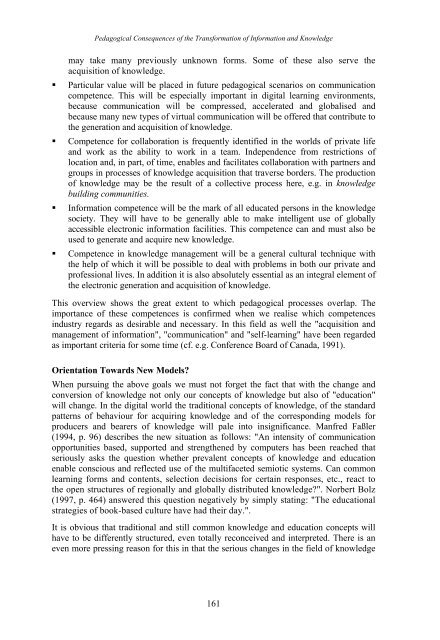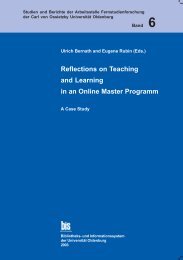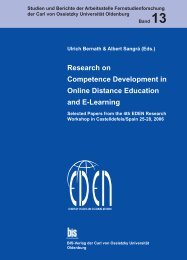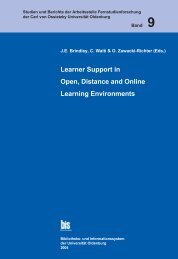Distance Education in Transition - Master of Distance Education ...
Distance Education in Transition - Master of Distance Education ...
Distance Education in Transition - Master of Distance Education ...
Create successful ePaper yourself
Turn your PDF publications into a flip-book with our unique Google optimized e-Paper software.
Pedagogical Consequences <strong>of</strong> the Transformation <strong>of</strong> Information and Knowledge<br />
may take many previously unknown forms. Some <strong>of</strong> these also serve the<br />
acquisition <strong>of</strong> knowledge.<br />
� Particular value will be placed <strong>in</strong> future pedagogical scenarios on communication<br />
competence. This will be especially important <strong>in</strong> digital learn<strong>in</strong>g environments,<br />
because communication will be compressed, accelerated and globalised and<br />
because many new types <strong>of</strong> virtual communication will be <strong>of</strong>fered that contribute to<br />
the generation and acquisition <strong>of</strong> knowledge.<br />
� Competence for collaboration is frequently identified <strong>in</strong> the worlds <strong>of</strong> private life<br />
and work as the ability to work <strong>in</strong> a team. Independence from restrictions <strong>of</strong><br />
location and, <strong>in</strong> part, <strong>of</strong> time, enables and facilitates collaboration with partners and<br />
groups <strong>in</strong> processes <strong>of</strong> knowledge acquisition that traverse borders. The production<br />
<strong>of</strong> knowledge may be the result <strong>of</strong> a collective process here, e.g. <strong>in</strong> knowledge<br />
build<strong>in</strong>g communities.<br />
� Information competence will be the mark <strong>of</strong> all educated persons <strong>in</strong> the knowledge<br />
society. They will have to be generally able to make <strong>in</strong>telligent use <strong>of</strong> globally<br />
accessible electronic <strong>in</strong>formation facilities. This competence can and must also be<br />
used to generate and acquire new knowledge.<br />
� Competence <strong>in</strong> knowledge management will be a general cultural technique with<br />
the help <strong>of</strong> which it will be possible to deal with problems <strong>in</strong> both our private and<br />
pr<strong>of</strong>essional lives. In addition it is also absolutely essential as an <strong>in</strong>tegral element <strong>of</strong><br />
the electronic generation and acquisition <strong>of</strong> knowledge.<br />
This overview shows the great extent to which pedagogical processes overlap. The<br />
importance <strong>of</strong> these competences is confirmed when we realise which competences<br />
<strong>in</strong>dustry regards as desirable and necessary. In this field as well the "acquisition and<br />
management <strong>of</strong> <strong>in</strong>formation", "communication" and "self-learn<strong>in</strong>g" have been regarded<br />
as important criteria for some time (cf. e.g. Conference Board <strong>of</strong> Canada, 1991).<br />
Orientation Towards New Models?<br />
When pursu<strong>in</strong>g the above goals we must not forget the fact that with the change and<br />
conversion <strong>of</strong> knowledge not only our concepts <strong>of</strong> knowledge but also <strong>of</strong> "education"<br />
will change. In the digital world the traditional concepts <strong>of</strong> knowledge, <strong>of</strong> the standard<br />
patterns <strong>of</strong> behaviour for acquir<strong>in</strong>g knowledge and <strong>of</strong> the correspond<strong>in</strong>g models for<br />
producers and bearers <strong>of</strong> knowledge will pale <strong>in</strong>to <strong>in</strong>significance. Manfred Faßler<br />
(1994, p. 96) describes the new situation as follows: "An <strong>in</strong>tensity <strong>of</strong> communication<br />
opportunities based, supported and strengthened by computers has been reached that<br />
seriously asks the question whether prevalent concepts <strong>of</strong> knowledge and education<br />
enable conscious and reflected use <strong>of</strong> the multifaceted semiotic systems. Can common<br />
learn<strong>in</strong>g forms and contents, selection decisions for certa<strong>in</strong> responses, etc., react to<br />
the open structures <strong>of</strong> regionally and globally distributed knowledge?". Norbert Bolz<br />
(1997, p. 464) answered this question negatively by simply stat<strong>in</strong>g: "The educational<br />
strategies <strong>of</strong> book-based culture have had their day.".<br />
It is obvious that traditional and still common knowledge and education concepts will<br />
have to be differently structured, even totally reconceived and <strong>in</strong>terpreted. There is an<br />
even more press<strong>in</strong>g reason for this <strong>in</strong> that the serious changes <strong>in</strong> the field <strong>of</strong> knowledge<br />
161





